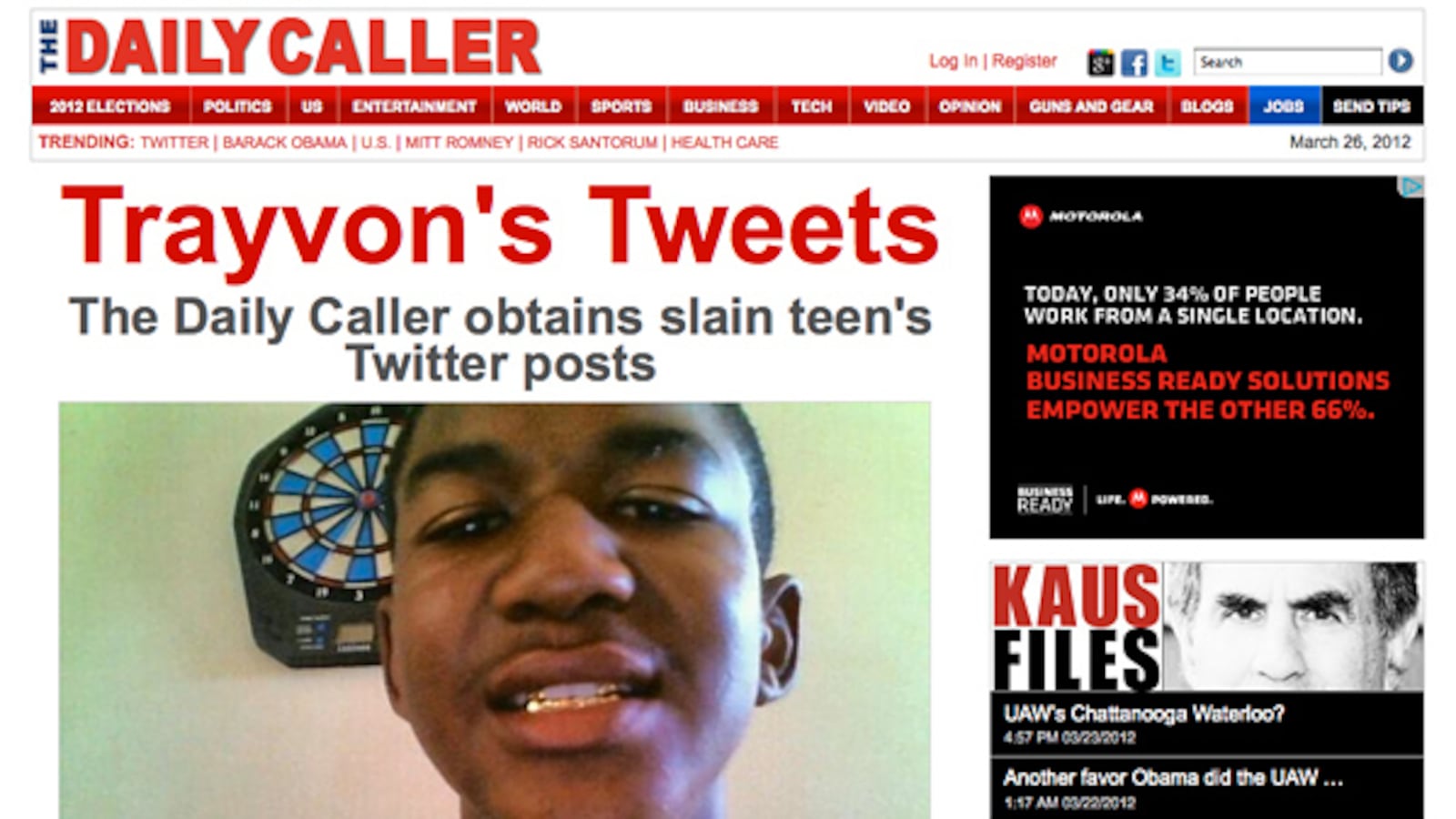First, there was the discussion of what Trayvon Martin was wearing. “I think the hoodie is as much responsible for Trayvon Martin’s death as George Zimmerman was,” Geraldo Rivera said on Fox & Friends last week, later suggesting that the sweatshirt made him look like a “wannabe gangster.” Then conservative bloggers started digging through Martin’s Facebook page for information that might raise doubts about his character. It turns out that one of Martin’s friends had written, under a happy birthday message, “damn were you at nigga needa plant;” according to Dan Riehl at Riehl World View, “Some may interpret that as Martin having somehow been involved in selling [marijuana].”

On Monday, The Daily Caller published a list of Martin’s tweets—his handle was @NO_LIMIT_NIGGA—that reveal him as a posturing teenager rather than a choirboy. (“Lol so daisha think she a boss caus she walked in class late 2day…I do dat everyday,” says one.) The story notes that the photograph attached to the account depicts Martin “smiling, gold-toothed, into a camera in front of an electronic dartboard.” Meanwhile the media was flooded with the news, if one could call it that, that Martin was once suspended from school for possession of a plastic baggie with marijuana residue on it.
“They've killed my son, and now they're trying to kill his reputation,” Martin’s mother, Sybrina Fulton, said after the suspension story broke.
I’m far from the first to notice the similarities between the way people talk about Martin and the way they talk about rape victims, whose clothes and histories are often subject to scrutiny no matter how cut-and-dried the case seems. Like a rape victim, Martin’s past is being excavated for evidence that he might have provoked the harm done to him. It hardly matters that even if Martin had gotten high every day, it would have had zero relevance; it’s not as if marijuana use is linked to violence. Nor that it’s not unusual for a teenager to come across as obnoxious on Twitter. People were looking for some tenuous justification for treating him as complicit in his own death, and now they’ve found it. (For the record, I was also suspended from high school, though in my case for smoking cigarettes. I trust that should a stranger shoot me in the street, no one will treat this as a mitigating factor.)
On the surface, it’s odd that Martin’s image would become so politicized. No ideological capitulation would be required for conservatives to mourn his death—one can believe in gun rights and still believe that he shouldn’t have been killed. A real NRA fanatic, after all, might make a case that Martin himself should have been armed, so that he could stand his ground against the paranoid man who was stalking him.
Certainly, it’s possible that some unknown evidence will emerge to complicate the current narrative of what happened between Zimmerman and Martin. Zimmerman claims that after he’d been following Martin, the young man attacked him, and according to the Orlando Sentinel, police found him “bleeding from the nose, [with] a swollen lip and had bloody lacerations to the back of his head.” No matter how things unfolded, there’s no excuse for those like Spike Lee who have tweeted Zimmeran’s home address; if nothing else, this case should make clear the horror of vigilantism.
But as of right now, some things are not in dispute. Martin was unarmed save for a pack of Skittles and an ice tea. Zimmerman, who repeatedly called the cops when he saw young black men in his gated community, trailed Martin after the police advised him not to. He called Martin either a “coon” or a “goon.” Martin had no documented history of violence. Zimmerman, on the other hand, was previously accused of hitting his ex-fiancé; in response, he said that she was the aggressor, which means he doesn’t deny that there was a physical fight.
So why this desire to paint Martin, rather than the man who shot him, as the guilty party? Partly, of course, it’s just a reaction to his death becoming a cause célèbre on the left—it’s the same sort of impulse that leads some conservatives to delight in “Fry Mumia” T-shirts. Beyond that, though, some on the right are deeply invested in the idea that anti-black racism is no longer much of a problem in the United States, and certainly not a problem on the scale of false accusations of racism. You might call these people anti-anti-racists. They are determined to push back against any narrative that would suggest that a black man has been targeted for the color of his skin.
Riehl does us the great favor of making such views explicit. “In the past when race hustlers like Jackson and Sharpton started their usual schtick over some alleged racial issue, they and the media were mostly allowed to run wild with it … But I don't have to tolerate it, now,” he writes, continuing, “[L]ast time I looked, there's a black guy in the White House. You want me to cry and feel sorry for you because America is such a racist country, or I need to explore some hidden racism deep within myself?”
Other anti-anti-racists are equally determined to deny that Martin’s blackness had anything to do with his death. When President Obama said, “If I had a son, he’d look like Trayvon,” Newt Gingrich reacted with the apoplexy he often shows in the face of anti-racism, saying, “Any young American of any ethnic background should be safe, period…. Is the president suggesting that, if it had been a white who'd been shot, that would be OK, because it wouldn't look like him?” Rick Santorum echoed, “What the president of the United States should do is try to bring people together, not use these types of horrible and tragic individual cases to try to drive a wedge in America.”
But if race has nothing to do with this case, then it makes no sense that Zimmerman was able to kill Martin without consequences—unless, of course, Martin did something to provoke him. If you don’t want to believe that racism is a problem in the United States, it helps to believe that Martin had it coming. Even if the only evidence is a school suspension, a tiny trace of pot, and the juvenile tweets of a kid trying to be cool.






